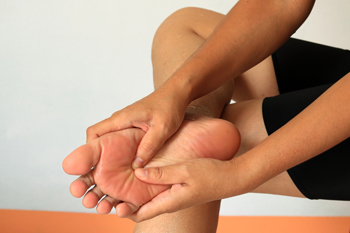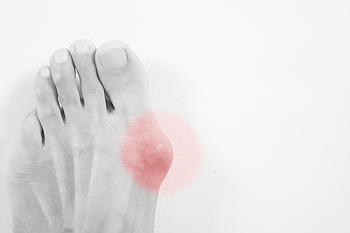Connect With Us
Blog
Items filtered by date: January 2020
Possible Causes of Morton’s Neuroma
 The medical condition that is known as Morton’s neuroma is defined as swelling around the nerves that pass between the bones in the foot. It can cause pain and discomfort at the ball of the foot, as well as a burning or numbing sensation in the toes. It can develop as a result of a muscular disorder, in addition to participating in certain sporting activities. Wearing high heels may cause this condition to develop, and this can be due to minimal room for the toes to move freely in. Effective treatments may consist of wearing custom made orthotics, and performing specific exercises and stretches that may help in the healing process. If you have any of these symptoms, it is advised that you are under the care of a podiatrist who can offer correct treatment techniques.
The medical condition that is known as Morton’s neuroma is defined as swelling around the nerves that pass between the bones in the foot. It can cause pain and discomfort at the ball of the foot, as well as a burning or numbing sensation in the toes. It can develop as a result of a muscular disorder, in addition to participating in certain sporting activities. Wearing high heels may cause this condition to develop, and this can be due to minimal room for the toes to move freely in. Effective treatments may consist of wearing custom made orthotics, and performing specific exercises and stretches that may help in the healing process. If you have any of these symptoms, it is advised that you are under the care of a podiatrist who can offer correct treatment techniques.
Morton’s neuroma is a very uncomfortable condition to live with. If you think you have Morton’s neuroma, contact Tanisha Richmond, DPM of Richmond Foot & Ankle, LLC. Our doctor will attend to all of your foot care needs and answer any of your related questions.
Morton’s Neuroma
Morton's neuroma is a painful foot condition that commonly affects the areas between the second and third or third and fourth toe, although other areas of the foot are also susceptible. Morton’s neuroma is caused by an inflamed nerve in the foot that is being squeezed and aggravated by surrounding bones.
What Increases the Chances of Having Morton’s Neuroma?
- Ill-fitting high heels or shoes that add pressure to the toe or foot
- Jogging, running or any sport that involves constant impact to the foot
- Flat feet, bunions, and any other foot deformities
Morton’s neuroma is a very treatable condition. Orthotics and shoe inserts can often be used to alleviate the pain on the forefront of the feet. In more severe cases, corticosteroids can also be prescribed. In order to figure out the best treatment for your neuroma, it’s recommended to seek the care of a podiatrist who can diagnose your condition and provide different treatment options.
If you have any questions, please feel free to contact our office located in Dayton, OH . We offer the newest diagnostic and treatment technologies for all your foot care needs.
Do Your Child's Feet Hurt?
How to Pick the Correct Shoe Size
 Many foot related conditions arise due to use of improper footwear. Wearing shoes that don’t fit your feet properly can lead to the development of bunions and hammertoes, as well cause poor circulation. In order to prevent these conditions, it’s suggested you take certain measures when shopping for your footwear. To begin, it is helpful to regularly measure your feet, as their size may change with age. When shopping for shoes, it’s suggested that you do so towards the end of the day when the feet are at their largest. By doing this, you’re avoiding buying shoes that may actually be too small for your feet. Ensure that there is enough room for your toes to move around, and that they are not being too confined. You should also try walking around in the shoes, that way you can better gage their overall comfort. For more tips on how to choose the perfect shoe for you, we suggest reaching out to a podiatrist for professional advice.
Many foot related conditions arise due to use of improper footwear. Wearing shoes that don’t fit your feet properly can lead to the development of bunions and hammertoes, as well cause poor circulation. In order to prevent these conditions, it’s suggested you take certain measures when shopping for your footwear. To begin, it is helpful to regularly measure your feet, as their size may change with age. When shopping for shoes, it’s suggested that you do so towards the end of the day when the feet are at their largest. By doing this, you’re avoiding buying shoes that may actually be too small for your feet. Ensure that there is enough room for your toes to move around, and that they are not being too confined. You should also try walking around in the shoes, that way you can better gage their overall comfort. For more tips on how to choose the perfect shoe for you, we suggest reaching out to a podiatrist for professional advice.
It is important to find shoes that fit you properly in order to avoid a variety of different foot problems. For more information about treatment, contact Tanisha Richmond, DPM from Richmond Foot & Ankle, LLC. Our doctor will treat your foot and ankle needs.
Proper Shoe Fitting
Shoes have many different functions. They cushion our body weight, protect our feet, and allow us to safely play sports. You should always make sure that the shoes you wear fit you properly in order to avoid injuries and deformities such as: bunions, corns, calluses, hammertoes, plantar fasciitis, stress fractures, and more. It is important to note that although a certain pair of shoes might be a great fit for someone else, that doesn’t mean they will be a great fit for you. This is why you should always try on shoes before buying them to make sure they are worth the investment. Typically, shoes need to be replaced ever six months to one year of regular use.
Tips for Proper Shoe Fitting
- Select a shoe that is shaped like your foot
- Don’t buy shoes that fit too tight, expecting them to stretch to fit
- Make sure there is enough space (3/8” to ½”) for your longest toe at the end of each shoe when you are standing up
- Walk in the shoes to make sure they fit and feel right
- Don’t select shoes by the size marked inside the shoe, but by how the shoe fits your foot
The shoes you buy should always feel as good as they look. Shoes that fit properly will last longer, feel better, and improve your way of life each day.
If you have any questions, please feel free to contact our office located in Dayton, OH . We offer the newest diagnostic and treatment technologies for all your foot care needs.
What You Need to Know About Your Bunion
 When the base of your big toe begins to jut outwards, that is normally a sign that you may have a bunion. This can occur due to a deformity with the toe joint, causing the big toe to begin to bend towards your other toes. Unfortunately, bunions are often accompanied with both pain and discomfort felt in the affected area. When this occurs, it is suggested you seek professional care from a podiatrist. They may develop due to hereditary reasons, as well as due to wearing tightly fitted shoes, socks, or tights, that do not conform to the shape of your foot. Bunion pads can be worn to help alleviate the pressure felt on the bunion, and icing the affected joint can be used as a means to lessen the pain experienced. For a proper diagnosis and an advised treatment plan, we suggest you consult with a podiatrist.
When the base of your big toe begins to jut outwards, that is normally a sign that you may have a bunion. This can occur due to a deformity with the toe joint, causing the big toe to begin to bend towards your other toes. Unfortunately, bunions are often accompanied with both pain and discomfort felt in the affected area. When this occurs, it is suggested you seek professional care from a podiatrist. They may develop due to hereditary reasons, as well as due to wearing tightly fitted shoes, socks, or tights, that do not conform to the shape of your foot. Bunion pads can be worn to help alleviate the pressure felt on the bunion, and icing the affected joint can be used as a means to lessen the pain experienced. For a proper diagnosis and an advised treatment plan, we suggest you consult with a podiatrist.
If you are suffering from bunion pain, contact Tanisha Richmond, DPM of Richmond Foot & Ankle, LLC. Our doctor can provide the care you need to keep you pain-free and on your feet.
What Is a Bunion?
Bunions are painful bony bumps that usually develop on the inside of the foot at the joint of the big toe. As the deformity increases over time, it may become painful to walk and wear shoes. Women are more likely to exacerbate existing bunions since they often wear tight, narrow shoes that shift their toes together. Bunion pain can be relieved by wearing wider shoes with enough room for the toes.
Causes
- Genetics – some people inherit feet that are more prone to bunion development
- Inflammatory Conditions - rheumatoid arthritis and polio may cause bunion development
Symptoms
- Redness and inflammation
- Pain and tenderness
- Callus or corns on the bump
- Restricted motion in the big toe
In order to diagnose your bunion, your podiatrist may ask about your medical history, symptoms, and general health. Your doctor might also order an x-ray to take a closer look at your feet. Nonsurgical treatment options include orthotics, padding, icing, changes in footwear, and medication. If nonsurgical treatments don’t alleviate your bunion pain, surgery may be necessary.
If you have any questions, please feel free to contact our office located in Dayton, OH . We offer the newest diagnostic and treatment technologies for all your foot care needs.
Treating Ingrown Toenails
 Ingrown toenails can be both uncomfortable and painful if left untreated. One of the most common causes of their development is hereditary or genetic factors. The curvature of your toenails are passed down to you, so if you have family members that are prone to getting ingrown toenails, it is likely you may run the same risk. Cutting your toenails too short is another cause of getting an ingrown toenail. If they are cut too short, the skin around the toe will adapt, forming an ingrown toenail. It is also advised you do not cut your toenails on an angle, rather trim them straight across. If you are experiencing pain, a podiatrist may suggest a splint to help stop the nail from growing any further into your skin. In more severe cases, a podiatrist may suggest surgery and full removal of the toenail. To help ease the pain, it’s recommended that you soak your feet in epsom salt, as this will also help to get rid of any bacteria under the toenails. For professional care we recommend you consult with a podiatrist who can advise you on the best course of treatment for your case.
Ingrown toenails can be both uncomfortable and painful if left untreated. One of the most common causes of their development is hereditary or genetic factors. The curvature of your toenails are passed down to you, so if you have family members that are prone to getting ingrown toenails, it is likely you may run the same risk. Cutting your toenails too short is another cause of getting an ingrown toenail. If they are cut too short, the skin around the toe will adapt, forming an ingrown toenail. It is also advised you do not cut your toenails on an angle, rather trim them straight across. If you are experiencing pain, a podiatrist may suggest a splint to help stop the nail from growing any further into your skin. In more severe cases, a podiatrist may suggest surgery and full removal of the toenail. To help ease the pain, it’s recommended that you soak your feet in epsom salt, as this will also help to get rid of any bacteria under the toenails. For professional care we recommend you consult with a podiatrist who can advise you on the best course of treatment for your case.
Ingrown toenails can become painful if they are not treated properly. For more information about ingrown toenails, contact Tanisha Richmond, DPM of Richmond Foot & Ankle, LLC. Our doctor can provide the care you need to keep you pain-free and on your feet.
Ingrown Toenails
Ingrown toenails occur when a toenail grows sideways into the bed of the nail, causing pain, swelling, and possibly infection.
Causes
- Bacterial infections
- Improper nail cutting such as cutting it too short or not straight across
- Trauma to the toe, such as stubbing, which causes the nail to grow back irregularly
- Ill-fitting shoes that bunch the toes too close together
- Genetic predisposition
Prevention
Because ingrown toenails are not something found outside of shoe-wearing cultures, going barefoot as often as possible will decrease the likeliness of developing ingrown toenails. Wearing proper fitting shoes and using proper cutting techniques will also help decrease your risk of developing ingrown toenails.
Treatment
Ingrown toenails are a very treatable foot condition. In minor cases, soaking the affected area in salt or antibacterial soaps will not only help with the ingrown nail itself, but also help prevent any infections from occurring. In more severe cases, surgery is an option. In either case, speaking to your podiatrist about this condition will help you get a better understanding of specific treatment options that are right for you.
If you have any questions please feel free to contact our office located in Dayton, OH . We offer the newest diagnostic and treatment technologies for all your foot and ankle needs.
Blog Archives
- April 2024
- March 2024
- February 2024
- January 2024
- December 2023
- November 2023
- October 2023
- September 2023
- August 2023
- July 2023
- June 2023
- May 2023
- April 2023
- March 2023
- February 2023
- January 2023
- December 2022
- November 2022
- October 2022
- September 2022
- August 2022
- July 2022
- June 2022
- May 2022
- April 2022
- March 2022
- February 2022
- January 2022
- December 2021
- November 2021
- October 2021
- September 2021
- August 2021
- July 2021
- June 2021
- May 2021
- April 2021
- March 2021
- February 2021
- January 2021
- December 2020
- November 2020
- October 2020
- September 2020
- August 2020
- July 2020
- June 2020
- May 2020
- April 2020
- March 2020
- February 2020
- January 2020
- December 2019
- November 2019
- October 2019
- September 2019
- August 2019
- July 2019
- June 2019
- May 2019
- April 2019
- March 2019
- February 2019
- January 2019
- December 2018
- November 2018

